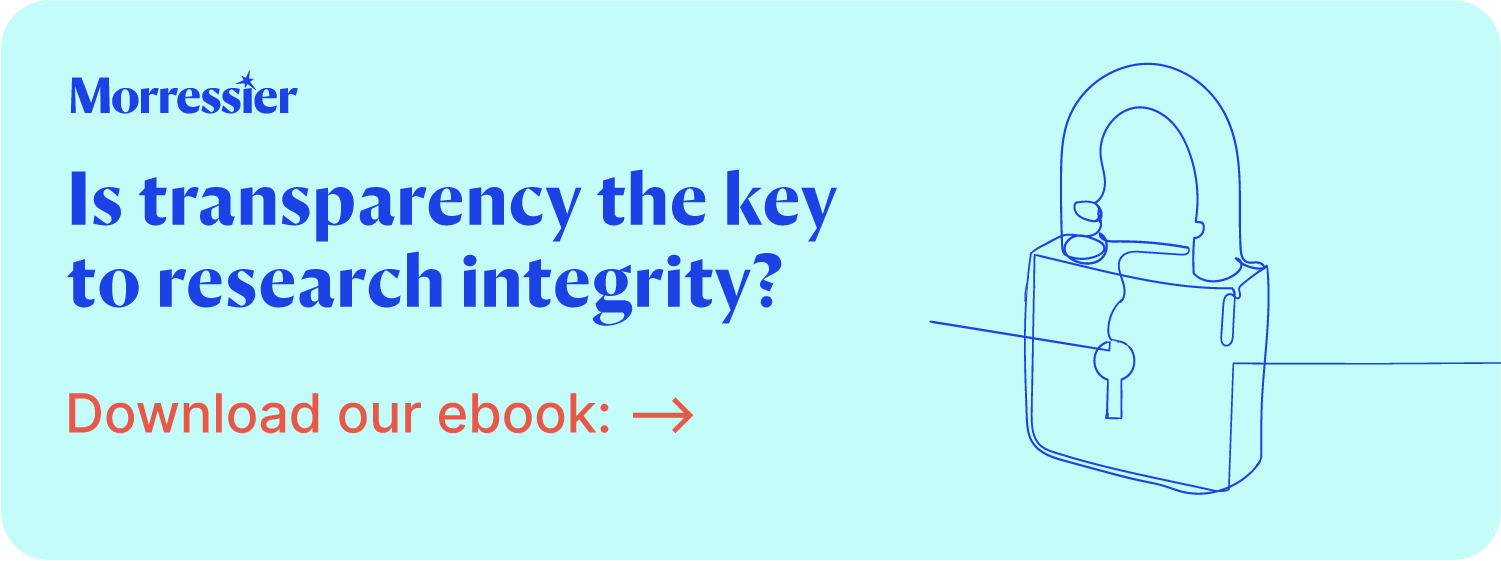[ RESEARCH INTEGRITY ] May 30, 2023
The questions we’re asking at SSP 2o23
It’s that time of the year again! The SSP conference is almost here and the Morressier team and I are eagerly preparing for an exciting few days in Portland, Oregon, from May 31st-June 2nd to discuss this year’s theme: “Transformation, Trust, and Transparency.”
This is my first SSP and I think this year’s conference carries a unique urgency. As systemic issues mount and fraud cases continue to rise, integrity is one of the biggest challenges facing our partners.
1. How can the speed of our existing infrastructure match the flow of information?
My colleague, Sami Benchekroun, recently asked the question, “Is Science Too Slow to Change the World?” in The Scholarly Kitchen. With today’s infrastructure, my answer is yes!
There is so much more that academic publishing workflows can do. Infrastructure provides the foundation for shifts to forward-looking business models and proactive change for the industry. But how?
We believe this shift begins with viewing new trends and technologies as opportunities rather than threats.
Long before I joined the team almost a year ago, Morressier has been delivering the latest transformative technologies to the market to advance scholarly communication. Where I come in is to provide a future-driven strategy that brings together the best of technology with innovative business models that support our clients’ missions.
One of our clients’ biggest concerns right now is research integrity, and managing the challenges of an ongoing reproducibility crisis, publication bias, questionable research practices, and the impact of predatory publishing. There is so much amazing work happening to identify misconduct, fraud, and errors before they can ever be published. Just last week, we announced our Integrity Suite. This fight is not just about today’s threats, it's about tomorrow’s, which is why there’s a huge opportunity for research integrity technology to be bold, proactive, and strategic.
2. What can we do about the worrying amount of fraud and integrity cases in recent years?
Science is based on trust. When we lose that trust, the very foundation on which the academic enterprise is built starts to break.
Nowadays, it seems like research misconduct cases and integrity issues hit headlines every other week. Just a few months ago, Clarivate’s Web of Science delisted 50 prominent academic journals due to a lack of quality control, impacting some of the world's biggest, high-impact publishers. Meanwhile, the rising pressure to publish is encouraging researchers to cut corners and lose foresight, falling prey to rogue temptations and predatory entities. What’s even more frightening is the lack of resources available to combat these problems. Where do we go from here?
I firmly believe that we can’t have conversations about transparency and research integrity separately. I know that right now the ecosystem is complicated, with multiple vendors and different systems. I advocate for changing the way we approach research integrity from a point solution to a holistic strategic approach - comprehensively evaluating each piece of research to add a layer of confidence to peer review.
I’m excited to discuss the potential of digital transformation next week and how we can lead the changes towards a better future.
3. Should authors have faith in today’s peer review process?
Should authors be expected to take integrity into their own hands?
I’m a big believer in the power and potential of peer review, but that doesn’t mean there isn’t room for improvement. Building a peer review process that authors, reviewers, and editors can trust starts with building better infrastructure and models that address the system’s weak points through more efficient and equitable practices that ensure high quality content.
It's all about scale, speed, and cost. Today’s publishers need a powerful suite of automated tools to identify integrity issues. They need to be able to grow and build their publishing programs, confident that the research they put out into the world is reliable. That’s where our Integrity Suite comes in. This industry needs to think big picture and move fast. I’m excited to talk about our roadmap to continue to strengthen our fight against research fraud with many of you at SSP.
4. Is an AI apocalypse on the horizon?
Stephen Hawking once said that AI could spell the end of the human race. Hawking advised that AI should be designed to assist and empower humans rather than replace or control them. I believe that we can follow this advice, harnessing the power of these smart technologies in a way that enhances human potential rather than diminishing it.
Consider the ways that AI can work to tackle bias and solve ethical concerns in scholarly communications, especially in the peer review process. Think about how AI can remove obstacles for authors for whom English is not their first language. Reflect on the ways AI has the potential to transform our publishing workflows, accelerating our ability to analyze and share work at scale.
AI tools cannot replace human judgement. But, with AI tools as valuable allies within the complex academic landscape, societies and publishers can become equipped with early intervention and prevention of research misconduct in order to ensure a more robust and trustworthy scientific ecosystem.
How can we overcome the - often valid - fears around AI, while applying them in creative and supportive ways for our industry?
Conclusion
If you’re attending SSP, make sure to stop at booth #107 to say hello! Until then, feel free to connect with me here on LinkedIn.
Join the rest of the team and I on SSP Day 1 at 3:00pm for an Industry Breakout session where we’ll embark on a visionary journey, exploring the boundless potential of technology and discuss finding the right blend of tools and strategies to shape a brighter future.
